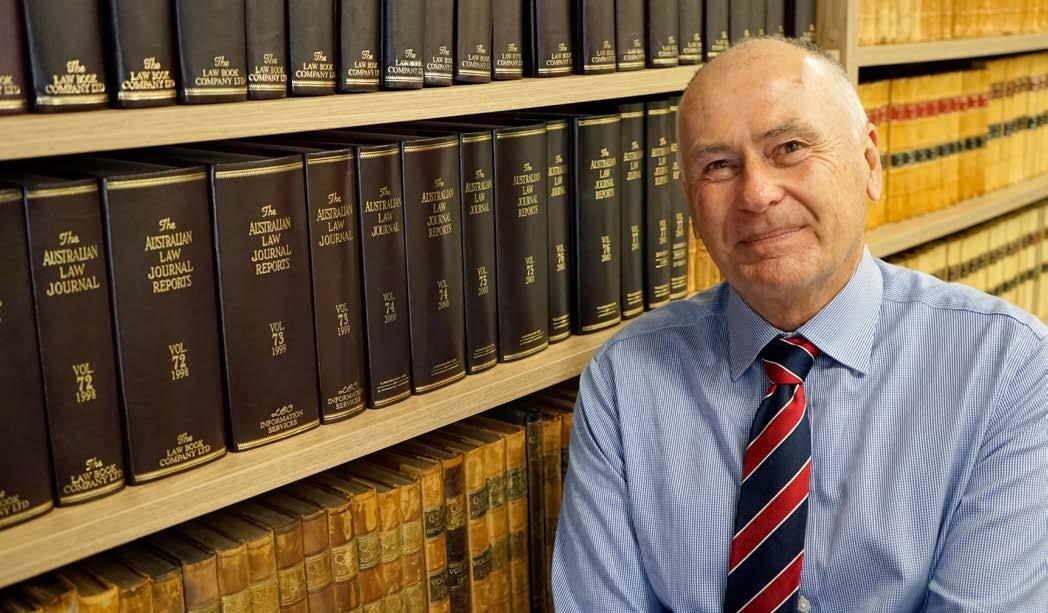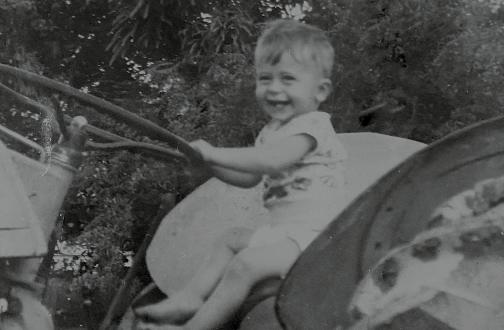
9 minute read
CHANGES AND INNOVATIONS ACROSS 40 YEARS
By Robyn Devine
As CANEGROWERS legal counsel for four decades, solicitor Chris Cooper has seen significant changes and impressive innovations in Australia’s sugar industry. And while growers have faced some challenging times of late, Chris remains optimistic about the industry’s evolving future.
Advertisement
Sugarcane has been in Chris Cooper’s blood since birth. Growing up on the family’s cane farm near Mount Coolum on Queensland’s Sunshine Coast, Chris spent his formative years helping out around the farm.
His parents and grandparents started developing a sugar cane farm in 1955 and supplied cane to the Moreton Central Sugar Mill in Nambour until the farm was sold in 1973.
Chris started his education firstly at the little Yandina Creek School, then Yandina State School before heading off to Nambour High until Grade 10. His final and seminal years were spent at boarding school in Brisbane, before taking the plunge into studying law at university.
While it wasn’t originally Chris’ intention to become a lawyer, an interesting twist of fate sent him down a career path that has meandered through four decades.

Young Chris helping out on the farm
“I wasn’t really sure what to do at university, I was very interested in sports and still am, but I watched an inspiring movie on TV about two lawyers the night before I had to submit my university choices. I remember watching the lawyers in the show and thinking they look like they lead an interesting life and so I decided to study law,” Chris said.
After finishing his articles of clerkship, Chris was asked to stay on as a first-year solicitor and has been one ever since.
“I have been very fortunate and had an interesting and satisfying career in the legal arena, particularly in the sugar industry. I guess apart from about four or five years when I was at uni and my parents had moved to grazing properties out west, I’ve been involved in the industry in some capacity my whole life,” Chris said.
Why the sugar industry?
In March 1983, Chris was approached by a colleague regarding an opening in the CANEGROWERS legal team. It was a unique opportunity to fuse his previous very real and practical understanding of sugarcane growing, having worked as a youngster on the family farm, with his legal experience and educational background. The position was for a junior in-house lawyer.
“CANEGROWERS, at that time, had a strong and wellresourced legal department due to the organisation’s responsibilities and requirements as a statutory body for the industry,” Chris explained.
“There was a senior lawyer and junior lawyer in-house and the organisation retained very reputable and well experienced Brisbane senior barristers on call as needed.
“There is a tremendous history about the legal services provided by CANEGROWERS over the time, using the best that was available. It was an exciting and stimulating group.
“It was an important role which flowed from the significant obligations that the organisation and its elected members had as a statutory body. One of their core functions was the making of an Award, now called a Cane Supply Agreement.
“Representatives were appointed by the local CANEGROWERS organisation and the local mill owner. The group was chaired by the local magistrate, and those five people, called the Local Board, were charged with making the Award for all growers and the sugar mill. That was automatically binding on every grower and the mill owner. It was a very significant role for the organisation’s members.
“Back then CANEGROWERS, as an organisation, had powers to appeal against those Awards if they didn’t think they were fair or they wanted improvements or better terms and conditions, or an increase in the sugar price or extra allowances in that contract.
“CANEGROWERS then had the entitlement to lodge an appeal to the Central Sugar Cane Prices Board, which was chaired by a very senior Supreme Court judge. The CANEGROWERS legal team would mount a case and argue that case every year, as the Award was made for only one season at a time.”
A significant change introduced to the industry in the mid-2000s, was rolling agreements instead of annual agreements.
“Every year there were many disputes so we would start in the North and work our way down, arguing these cases in every sugar town before this very senior appellate body with our senior barristers in tow and we’d argue our cases and move on to the next town,” Chris explained.

“This was a very significant thing that the organisation did on behalf of its growers. We still perform that role today, but it has evolved somewhat, and we don’t see the same level of disputes. The mechanisms for resolving disputes are not as simple and efficient as they used to be, but they’re still there and we still get involved with disputes with the mills from time to time.”
The growers valued the barristers and enjoyed briefing them on the merits of their case and showing them the highlights of their town, occasionally taking the opportunities to fish or showcase the best barramundi in the rivers after a long day in court.
“We were busy but we also made sure we took the time to engage with the local districts and get a feel from the growers. There was a good balance of working hard and also enjoying the local areas and people.” Chris said.
Change is always difficult, and the deregulation of the sugar industry in 20052006 was a challenge for the whole of the industry, particularly for growers. There were changes within industry itself and changes in the relationship between growers and millers. Significantly, grower rights and protections that were afforded by the legislation were removed and replaced with commercial arrangements.
However, overall growers handled that transition very well, Chris believes.
CANEGROWERS also changed dramatically around the same time, going from a statutory body with compulsory membership and statutory levying power to a voluntary membership organisation. “The organisation changed from a statutory body to a voluntary membership, but CANEGROWERS managed to maintain a high level of membership, which is unique throughout Australian primary production.
“In my experience, the organisation is very much admired around the world in agricultural circles. The way the organisation is structured and functions, and how well its supported by its members, and what it achieves at a local, state, national and international level for those members, is very much admired.”
Future for growers
Chris sees a bright future for the industry and believes cane farming remains a fantastic way to live and raise a family.
“A few years ago there were concerns, and yes, we have lost a lot of area that was under cane, whether it’s to urban expansion, competing land use, or in some areas it’s gone out of production through no fault of the industry,” Chris said.
“It is understandable that in some districts there has been incredible prices offered for cane farming land by nut and tree growers, and some growers have taken the opportunity to move out of the industry.
“But the fundamental parts of the industry are still very strong. It’s still a very solid industry. There are always challenges, but there is not a lot of residual debt in the industry, so many growers are able to weather the ups and downs.
“Currently the inputs costs have been high, but fortunately at the moment the market looks very good and has been good for a while.
“One of the benefits that Queensland growers enjoy is the ability to forward price and we are unique in the world market with that. It’s one of the many innovations that the Australian industry has been able to introduce, benefiting the industry and growers.
“We continue to be admired by the international agricultural industries for a whole range things including this capacity to manage pricing and forward price. It’s got to be done carefully and sensibly but at the moment there is an opportunity for growers to lock in prices a few years out that are reasonably good, despite the input costs.
“It’s still a strong resilient industry and there is a focus now for the future on value adding opportunities for bioproducts and diversification, and with the government now getting behind this, there appears to be a commitment in this space.
“The hope now is that there will be commercial viability. It’s not hard to make things from sugarcane and sugar waste products, it’s making them affordable that’s the key.
“Sugar will remain the main driver of the industry, but if there are real commercial options that will provide extra revenue for growers and millers that can be shared appropriately it will underpin the industry going forward. I’m confident that this will be the case.
“The past 40 years have been interesting, and the industry continues to evolve. It has always made its mark on the world, like with mechanical harvesting, building sugar terminals, forward pricing, all sorts of innovations have been possible because of the people that are in the industry.
“I have developed a lot of friends and relationships over the years. It’s the people that make the industry, the growers themselves and the people that work supporting the growers.
“It’s an exciting, fun and great place to work.”








